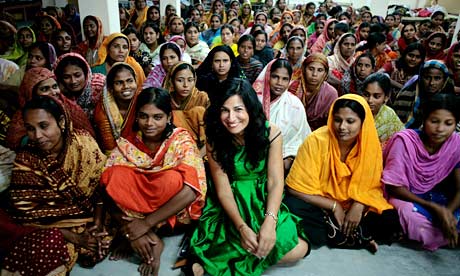
(via)
"Ethical fashion: myth or future trend?" is a feature from the Journal of Fashion Marketing and Management, which seeks to provide a forum for the publication of refereed, academic papers and more applied case study material in the fashion manufacture and retail sectors. It also seeks to draw contributions from all over the world, recognizing the international nature of the garment and retail industries. This piece was published in 2006, which is pretty recent and therefore still applies today.
Catrin Joergens, the author, is currently the Global Senior Product Manager for the NEO Label in the Sports and Style Division at Adidas in Shanghai. She was educated at The University of Manchester where she studied international fashion marketing and at Hochshule Niederrhein where she studied textile and clothing management.
The approach is analytical and empirical considering it is basically a case study utilizing research methodologies such as focus groups and questionnaires to come to conclusions.
Ethical fashion: fashionable clothes that incorporate fair trade principles with sweatshop-free labour conditions while not harming the environment or workers by using biodegradable and organic cotton.
There is a rise in the ethical consumer market because of new ethical fashion brands such as American Apparel and People Tree, who are trying to bring a fresher approach to the market and to gain interest from the ordinary fashion consumer. These actions bring about the issue about whether ethical consumerism is “back in fashion”.
People Tree’s Safia Minney with workers in Bangladesh
(via)
Primary research was undertaken that focused on the following topics of research in regards to ethical fashion: awareness and concerns about ethical issues in the fashion industry, resulting behavior, beliefs about ethical fashion, effect on purchase decisions, and attitudes towards possible solutions. The overarching theme, however, is whether consumers are willing to “sacrifice their personal needs to support ethically produced clothing”.
The sample groups were conducted in Frankfurt, Germany and Manchester, England. In Germany, the respondents of the focus group were all students between 21-25, and between 22-26 in England. This sample was chosen specifically because they are the next generation of ethical consumers and seem to take more interest in fashion than any other group of consumers.
As for the group discussions, there were five people in Germany and four in England, which are considered small sample sizes because the recommended size for groups are usually 8-14 unless the subject matter is sensitive. In which case, fewer participants would be advised.
The questionnaires were sent out via e-mail to 100 participants in Germany as well as in England. But only 64 were completed and sent back in Germany and 53 in England.
Noir (Danish ethical label) Catwalk at London Fashion Week 2009
(via)
The results of the focus groups in Germany were that even though participants were aware of ethical issues in the fashion industry and even the working conditions, these were not the main concerns when shopping. The prices of the clothing seemed to forgo ethical issues as well as the image of the product. Environmental concerns were even less of an interest. Conclusively, the reason for poor awareness of major issues is because of little media coverage and therefore it is hard to differentiate between companies that have good social responsibility and poor social responsibility. As for potential of ethical fashion, some participants are in conflict about whether unethical business behavior would really influence their shopping behaviors, but in the end it really matters about style and price.
In the UK, findings were similar, however the biggest issue participants have towards the fashion industry is the huge offer of disposable fashion and wearing fur. They also seem to have no knowledge about environmental issues or health damages to workers during the production process. And even though they do look for the “Made in” sign and think about the consequences, it still does not influence their buying decisions at the end. One person states “you actually have to define ethics and what is acceptable in that country” showing that it is difficult for them to define unethical behavior. Also, one of the main difficulties for the potential of ethical fashion is the limited offerings of ethical products that fit their tastes and prices. Merely having information about the ethical issue is not enough to allow them to make the right choices because it is hard to tell which brands utilize certain conditions in producing clothing.
In conclusion, all of the participants would prefer that their clothing was produced ethically, but the crucial buying decisions are style and prices, which both supersede the ethical issues. Also, these participants and consumers feel like they do not have much of a choice when it comes to buying ethically produced clothing because the majority of the apparel is available only through catalog order, not worth the prices, or not considered fashionable compared to other brands. Therefore, mere knowledge on this issue is not enough to strongly influence purchase decisions.
Nevertheless, the majority of respondents showed favorable attitudes to buy ethical fashion and see a potential in this approach as long as it is comparable in fashion and price to other brands. The majority also thinks that consumers have to take the responsibility as well as the corporate sector and government to force companies to act more ethically. Although the findings from this research did not demonstrate that ethical issues affect consumers’ fashion behavior, it is difficult to draw definite conclusions about ethical behavior since only one specific group was examined. More knowledge about ethical issues in the fashion industry is needed as well.
(via)








